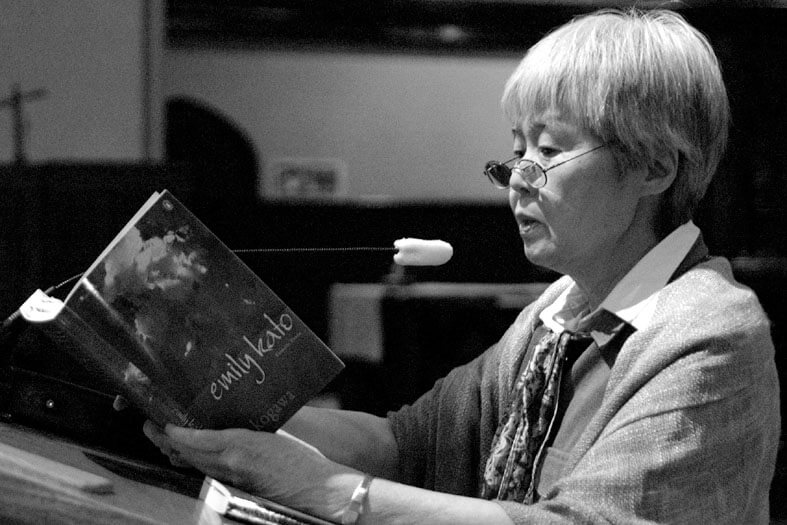Joy Kogawa’s remarks from the Remembering Redress event on Oct 5, 2019.
We’re here tonight to celebrate some special people—those who stood with us. People who do this kind of thing, who embrace the despised, are different. They have fewer blind spots. They’re not afraid of you, just because you look like the enemy. So tonight we’re saying ‘thank you.’ Thank you for having walked with us. We remember you. We remember the ways you carried us and buoyed us up.
For decades following the forties, no official statement came to tell us we were not the enemy. But then came September 22, 1988. What a day that was. The blind spot was officially gone. The country rubbed its eyes and said, “Oh, there you are. Good morning. We see you. Of course you weren’t the enemy. We’re sorry. We were wrong.“
A stunning acknowledgment. A blessed day.
I was sitting in the gallery of the House of Commons on Parliament Hill and there was a moment that knocked me out. I saw our beloved Ed Broadbent stand up holding a book. Turned out, unbelievably, that was MY book. And in a voice choking with emotion, he read from Obasan. WHAT? I couldn’t speak. Later at a reception, he came over to say hello and I still couldn’t speak. AT ALL. It’s now thirty-one years later. Ed. I’m so glad you agreed to be here tonight. I’m so glad for this moment to be able to say, “Thank you. Thank you, Ed for that stupefying moment, and even if I get dementia, I swear I won’t forget that.”
I’m grateful altogether for that day, and for our beautiful, imperfect and often gracious country. OUR country.
What makes a person capable of standing with those who suffer? It has to do with having a good and healthy heart, a heart so buoyant, so filled with good things that it can carry others. How does that happen?
We have within us, tendrils of sight. In the darkest of nights, those tendrils do not give up the search for the inner light. They reach down, deep down, till they touch water, a wellspring of the love that is everywhere whether we know it or not. And what sweet sweet moisture, what thankfulness then rises, rises.
Tonight in this tiny corner of a planet in the sufferings of the sixth extinction, we are having a little exercise for the cultivation of the buoyant heart. A moment of touching water. A moment of trust that in the darkness of our time, we will seek and find that nourishment. And we will know that the other is not our enemy, that our blindspots can dissolve and that another moment is on its way and that we will see what we do not yet see—the connectedness of all, and the friend that is hidden within every enemy.
So much of our work, to show we were not the enemy, happened here in this space. Kerri Sakamoto helped to organize Toronto’s first public meeting on redress here. This church hidden among the cathedrals of commerce is a Trojan Horse. Thanks to this congregation – to Merylie Houston who organized the potluck and Jim who welcomed you, two of the pillars of Holy Trinity. The Ad Hoc Committee for Japanese Canadian Redress were pillars for us in the 80’s. Dan and Alice Heap, Cyril Powles. Michael Creal at 90 remains vigorous and visionary and is the last one remaining of that Committee. Their Globe and Mail ad garnered national support and laid the foundation for the ethnocultural groups that joined us. Alan Borovoy, Ted Scott, Mary Jo Leddy, such giants, spoke at the Ottawa rally. There are too many people I’m missing, since I’m only speaking from memory which is growing feebler by the day. People like Ernie Best – Bronwyn and Helen Best are here tonight.
Back in the 40’s missionaries came to the camps. In Slocan—Miss Horobin, Miss Heaps and Miss Bowmen, Miss Foster. Grace Tucker was in touch with Andrew Brewin in Ottawa. The missionaries lived among us, taught us, lobbied for us, fed us and were the face of love in a loveless time.
The issei pioneers with their profound arigatai were with us. Every single day my issei mother said, “Tenno Otosama, ima made mamotte kudasai mashite arigato gozaimasu.” Heavens Father, for thus far protection, thankyou. The Issei are gone but their legacy lingers on. And we Nisei, are in our turn, rapidly wafting away. But some of us are still around. Bill and Addie Kobayashi and Toshi Oikawa who are here worked day and night for redress for years. And so did many others. There was Sodan Kai – so named by Shin. Shin and Maryka and Ron and Edy—labelled the young militant radicals.
There are too many people I’ve not named, but on a very personal note, off the topic of remembering redress – here’s Ann-Marie Metten all the way from Vancouver, the executive director of Kogawa House. At great personal cost, she has steadfastly carried the work of the house and she has carried much suffering with me and for me. No thankyou’s are enough for that.
Finally, thanks to JCSJ – Japanese Canadians for Social Justice who organized tonight. We take our stand with those who reach out and call our name. Come join us. Any little bit of health we can offer others and each other helps. There’s so much to be done.
Time’s up. May our tendrils of sight drink deep from the well of thanksgiving tonight.






